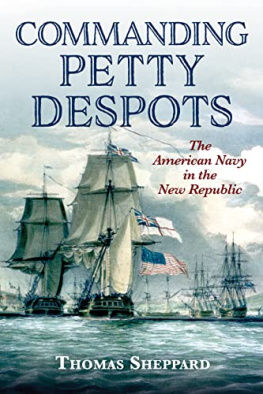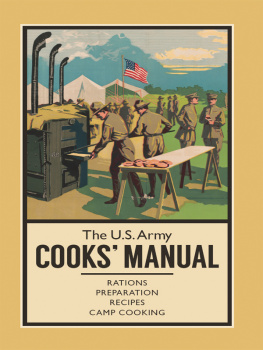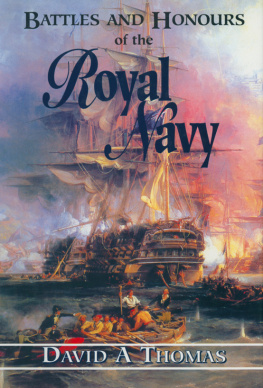Thomas Sheppard - Commanding Petty Despots: The American Navy in the New Republic
Here you can read online Thomas Sheppard - Commanding Petty Despots: The American Navy in the New Republic full text of the book (entire story) in english for free. Download pdf and epub, get meaning, cover and reviews about this ebook. year: 2022, publisher: Naval Institute Press, genre: History. Description of the work, (preface) as well as reviews are available. Best literature library LitArk.com created for fans of good reading and offers a wide selection of genres:
Romance novel
Science fiction
Adventure
Detective
Science
History
Home and family
Prose
Art
Politics
Computer
Non-fiction
Religion
Business
Children
Humor
Choose a favorite category and find really read worthwhile books. Enjoy immersion in the world of imagination, feel the emotions of the characters or learn something new for yourself, make an fascinating discovery.
- Book:Commanding Petty Despots: The American Navy in the New Republic
- Author:
- Publisher:Naval Institute Press
- Genre:
- Year:2022
- Rating:4 / 5
- Favourites:Add to favourites
- Your mark:
- 80
- 1
- 2
- 3
- 4
- 5
Commanding Petty Despots: The American Navy in the New Republic: summary, description and annotation
We offer to read an annotation, description, summary or preface (depends on what the author of the book "Commanding Petty Despots: The American Navy in the New Republic" wrote himself). If you haven't found the necessary information about the book — write in the comments, we will try to find it.
Commanding Petty Despots: The American Navy in the New Republic — read online for free the complete book (whole text) full work
Below is the text of the book, divided by pages. System saving the place of the last page read, allows you to conveniently read the book "Commanding Petty Despots: The American Navy in the New Republic" online for free, without having to search again every time where you left off. Put a bookmark, and you can go to the page where you finished reading at any time.
Font size:
Interval:
Bookmark:
COMMANDING PETTY DESPOTS
The American Navy in the New Republic
THOMAS SHEPPARD
Naval Institute Press
Annapolis, Maryland
Naval Institute Press
291 Wood Road
Annapolis, MD 21402
2022 by Thomas Sheppard
All rights reserved. No part of this book may be reproduced or utilized in any form or by any means, electronic or mechanical, including photocopying and recording, or by any information storage and retrieval system, without permission in writing from the publisher.
Library of Congress Cataloging-in-Publication Data
Names: Sheppard, Thomas, 1985 author.
Title: Commanding petty despots: the American Navy in the new republic / by Thomas Sheppard.
Other titles: American Navy in the new republic
Description: Annapolis, Maryland: Naval Institute Press, [2022] | Includes bibliographical references and index.
Identifiers: LCCN 2021045969 (print) | LCCN 2021045970 (ebook) | ISBN 9781682477557 (hardcover) | ISBN 9781682477564 (ebook) | ISBN 9781682477564 (epub)
Subjects: LCSH: United States. NavyHistory18th century. | United States. NavyHistory19th century. | United StatesHistory, NavalTo 1900.
Classification: LCC E182.S54 2022 (print) | LCC E182 (ebook) | DDC 359.00973/09033-dc23
LC record available at https://lccn.loc.gov/2021045969
LC ebook record available at https://lccn.loc.gov/2021045970
Print editions meet the requirements of ANSI/NISO Z39.48-1992 (Permanence of Paper). Printed in the United States of America.
30 29 28 27 26 25 24 23 22 9 8 7 6 5 4 3 2 1
First printing
To my family
MY NAME is the one on the cover, but completing this book would have been impossible without the generous support of a host of people. Even as I write this, I feel sure I will overlook at least a few whose names deserve to be listed, so apologies in advance to anyone who belongs here. Know that I am immensely grateful for the support I have received from each and every person who offered feedback, research tips, professional guidance, and mental and emotional support over the decade-plus that this project has been in gestation.
Adam Kane has been exceedingly patient with my ever-expanding timetable for completion, and his support for this project has been unwavering. Thanks also to acquisitions editor Glenn Griffin, production editor Caitlin Bean, and copy editor extraordinaire Aden Nichols for seeing it through to publication. Two anonymous reviewers also offered helpful feedback that made for a stronger finished product.
This book began many years ago as an MA thesis under the guidance of Sally Hadden, who was invaluable in getting me started on my academic career. Wayne Lee was an ideal mentor in the doctoral dissertation phase of the project, as was Richard Kohns keen insight into civil-military relations. Joseph Glatthaar, Kathleen Duval, and Dirk Bonker provided able guidance on my dissertation committee.
Thanks to the generous support of the Smith-Richardson Foundation, I was able to spend a year as a predoctoral fellow at Yale Universitys International Security Studies Institute, which was an enormous asset not only to my ability to finish writing the dissertation, but also to grow professionally. Many thanks to Paul Kennedy for his mentorship, and to my co-fellows and the staff at ISS for making it such a delightful season of my life.
While writing both the dissertation and book manuscript, I was fortunate to be able to make multiple trips to the David Library of the American Revolution while it was located at its lovely former home in Washingtons Crossing, Pennsylvania. This beautiful setting provided a wonderful getaway for research and writing retreats, and its vast resources were a treasure for expanding my knowledge of the Revolution and early republic. Meg McSweeney and Kathie Ludwig were charming and helpful hosts on every trip there.
The unfailingly friendly service at the Library of Congress and the National Archives and Records Administration made research easier, as did the supportive staffs of the Historical Society of Pennsylvania, the Peabody-Essex Museum of Salem, Massachusetts, the Earl Gregg Swem Library at the College of William and Mary, and the New York Historical Society.
It is impossible to overstate Christopher McKees contribution to this book. Over the years, he willingly provided from his vast knowledge in research guidance and feedback, first on the dissertation, then on multiple iterations of book chapters. His enthusiasm for the project inspired and motivated me to keep pressing on with it, and saved me from many mistakes. He has my hearty thanks.
My colleagues at Naval History and Heritage Command have been consistently supportive, regularly asking for updates on my writing and sharing their excitement for this books progress. Moreover, they are simply a delight to work with, and I cannot miss the chance to single out Ryan Peeks, Justin Blanton, Charles Brodine, Christine Hughes, Dennis Conrad, Anna Holloway, and Matt Yokell for their support and friendship.
In the time I have been working on this project Ive lived a somewhat migratory existence, pitching my tent in Chapel Hill, North Carolina; New Haven, Connecticut; and the Washington Metro Area. Some stays were longer than others, but every place was home thanks to the wonderful community of faith I found there. My brothers and sisters at Chapel Hill Bible Church, Trinity Baptist Church of New Haven, and McLean Bible Church of Arlington have enriched my life beyond description, while also consistently showing me I was put on this earth for so much more than lines on a vita. To friends and companions too many to list, thank you.
My family has been faithfully in my corner on this project and everything else Ive ever attempted. For their love and support over a lifetime, this book is dedicated to them.
JUNE 1, 1813. Captain James Lawrence darted up the rigging of the American frigate Chesapeake to get a glimpse of the unknown ship over the horizon. He felt a rush of excitement as he peered through his spyglass at the strange sail, for he had good reason to believe it was a British frigate rumored to be in the vicinity, and that the enemy vessel was as eager to find him as he was it. He was not disappointedthe Royal Navys Shannon, almost exactly equal in size and firepower with the Chesapeake, was waiting for Lawrence, alone. Once the Shannon drew near enough to clearly identify, a ship-to-ship duel was Lawrences, if only he chose to engage. For the young captain, there was no decision to make. A year into the war, the American navy had already stunned observers on both sides of the Atlantic by winning a series of engagements with the heretofore invincible British navy, and Lawrence burned for the chance to add his name to those of Isaac Hull, Stephen Decatur, and William Bainbridge, his seniors who had humbled the Britishand won lasting glory for themselvesin single combat. Rallying his men, Lawrence informed them of the British frigate and fired up their patriotic passions as he prepared for combat. At this point a few began grumbling that they were late getting paid their prize money for earlier captures. Lawrence promptly ordered all accounts with the crew settled; he wanted every mans heart in the coming battle. The moment all American officers dreamed of was finally his.
Meanwhile, British captain Philip Broke was no less eager to engage. Broke felt the humiliation of his countrys losses to the Americans as keenly as any officer, and he was confident his experienced crew was up to the task of avenging British honor. In fact, Broke was so determined to engage the Chesapeake that he had even sent a letter with an American prisoner into Boston harbor, issuing a challenge to the American frigate and promising to send away any other ships of the British blockading squadron to guarantee a fair fight. The Chesapeake had already sailed by the time the letter reached Boston, but it hardly mattered. Lawrence made course straight for the Shannon, and the battle began just before six oclock that evening.
Next pageFont size:
Interval:
Bookmark:
Similar books «Commanding Petty Despots: The American Navy in the New Republic»
Look at similar books to Commanding Petty Despots: The American Navy in the New Republic. We have selected literature similar in name and meaning in the hope of providing readers with more options to find new, interesting, not yet read works.
Discussion, reviews of the book Commanding Petty Despots: The American Navy in the New Republic and just readers' own opinions. Leave your comments, write what you think about the work, its meaning or the main characters. Specify what exactly you liked and what you didn't like, and why you think so.










